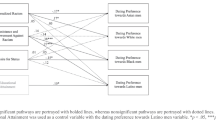Abstract
The present study explored attitudes toward feminism in 245 U.S. college students and their older relatives. Participants completed a scale of attitudes towards feminism, political orientation, a religiosity measure, and a demographic questionnaire. Results indicated that older adults were more conservative than younger adults on their attitudes towards feminism, religiosity, and political orientation measures. In the young adult sample, attitudes towards feminism were predicted by gender and political orientation, compared to older adults in which religiosity and political orientation were the best predictors. When exploring generational influence, older adults’ attitudes and demographic information were not associated with younger adults’ attitudes towards feminism and the women’s movement. In contrast, young adults’ political views were associated with older adults’ attitudes towards feminism.

Similar content being viewed by others
References
Aronson, P. (2003). Feminists or “postfeminists”? Young women’s attitudes toward feminism and gender relations. Gender & Society, 17, 903–922. doi:10.1177/0891243203257145.
Axinn, W. G., & Thornton, A. (1993). Mothers, children, and cohabitation: The intergenerational effects of attitudes and behavior. American Sociological Review, 58, 233–246. doi:10.2307/2095968.
Blanchard-Fields, F., Hertzog, C., Stein, R., & Pak, R. (2001). Beyond a stereotyped view of older adults’ traditional values. Psychology and Aging, 16, 483–496. doi:10.1037/0882-7974.16.3.483.
Bryant, A. N. (2003). Changes in attitudes toward women’s roles: Predicting gender-role traditionalism among college students. Sex Roles, 48, 131–142. doi:10.1023/A:1022451205292.
Bureau of Labor Statistics. (2000). Changes in women’s labor force participation in the 20th century. Retrieved May 25, 2008, from http://www.bls.gov/opub/ted/2000/Feb/wk3/art03.htm.
Burt, K. B., & Scott, J. (2002). Parent and adolescent gender role attitudes in 1990s Great Britain. Sex Roles, 46, 239–245. doi:10.1023/A:1019919331967.
Cichy, K. E., Lefkowitz, E. S., & Fingerman, K. L. (2007). Generational differences in gender attitudes between parents and grown offspring. Sex Roles, 57, 825–836. doi:10.1007/s11199-007-9314-1.
Clifton, A. K., McGrath, D., & Wick, B. (1976). Stereotypes of woman: A single category? Sex Roles, 2, 135–148.
Dambrot, F. H., Papp, M. E., & Whitmore, C. (1984). The gender-role attitudes of three generations of women. Personality and Social Psychology Bulletin, 10, 469–473. doi:10.1177/0146167284103015.
Duncan, L. E., & Agronick, G. S. (1995). The intersection of life stage and social events: Personality and life outcomes. Journal of Personality and Social Psychology, 69, 558–568. doi:10.1037/0022-3514.69.3.558.
Duncan, L. E., & Stewart, A. J. (2000). A generational analysis of women’s rights activists. Psychology of Women Quarterly, 24, 297–308. doi:10.1111/j.1471-6402.2000.tb00212.x.
Eisenberg, A. R. (1988). Grandchildren’s perspectives on relationships with grandparents: The influence of gender across generations. Sex Roles, 19, 205–217. doi:10.1007/BF00290155.
Etaugh, C. (1975). Biographical predictors of college students’ attitudes toward women. Journal of College Student Personnel, 16, 273–276.
Fassinger, R. E. (1994). Development and testing of the attitudes toward feminism and the women’s movement (FWM) scale. Psychology of Women Quarterly, 18, 389–402. doi:10.1111/j.1471-6402.1994.tb00462.x.
Glass, J., Bengtson, V. L., & Dunham, C. C. (1986). Attitude similarity in three-generation families: Socialization, status inheritance, or reciprocal influence? American Sociological Review, 51, 685–698. doi:10.2307/2095493.
Hitlin, S. (2006). Parental influences on children’s values and aspirations: Bridging two theories of social class and socializations. Sociological Perspectives, 49, 25–46. doi:10.1525/sop.2006.49.1.25.
Hoge, D. R. (1972). A validated intrinsic religious motivation scale. Journal for the Scientific Study of Religion, 11, 369–376. doi:10.2307/1384677.
Huddy, L., Neely, F. K., & Lafay, M. R. (2000). Poll trends: Support for the women’s movement. Public Opinion Quarterly, 64, 309–350. doi:10.1086/317991.
Jacobson, M. B. (1979). A rose by any other name: Attitudes toward feminism as a function of its label. Sex Roles, 5, 365–371. doi:10.1007/BF00287404.
Koenig, H. G., Smiley, M., & Gonzales, J. A. P. (1988). Religion, health, and aging: A review and theoretical integration. New York: Greenwood Press.
Kuczynski, L., Marshall, S., & Schell, K. (1997). Value socialization in a bidirectional context. In J. E. Grusec & L. Kuczynski (Eds.), Parenting and the internalization of values: A handbook of contemporary theory (pp. 23–50). New York: Wiley.
Loo, R., & Thorpe, K. (1998). Attitudes toward women’s roles in society: A replication after 20 years. Sex Roles, 39, 903–912. doi:10.1023/A:1018832823010.
Lottes, I. L., & Kuriloff, P. (1992). The effects of gender, race, religion, and political orientation on the gender role attitudes of college freshman. Adolescence, 27, 675–688. an: 1993-07492-001.
Lyons, S., Duxbury, L., & Higgins, C. (2005). Are gender differences in basic human values a generational phenomena? Sex Roles, 53, 763–778. doi:10.1007/s11199-005-7740-4.
Marks, J. L., Bun Lam, C., & McHale, S. M. (2009). Family patterns of gender role attitudes. Sex Roles, 61, 221–234. doi:10.1007/s11199-009-9619-3.
Mason, K. A., & Lu, Y. (1988). Attitudes toward women’s familial roles: Changes in the United States, 1977-1985. Gender & Society, 2, 39–57. doi:10.1177/089124388002001004.
McCabe, J. (2005). What’s in a label? The relationship between feminist self-identification and “feminist” attitudes among U.S. women and men. Gender & Society, 19, 480–505. doi:10.1177/0891243204273498.
Miller, R. B., & Glass, J. (1989). Parent-child attitude similarity across the life course. Journal of Marriage and the Family, 51, 991–997. doi:10.2307/353211.
Moen, P., Erickson, M. A., & Dempster-McClain, D. (1997). Their mother’s daughters? The intergenerational transmission of gender attitudes in a world of changing roles. Journal of Marriage and the Family, 59, 281–293. doi:10.2307/353470.
Mookherjee, H. N. (1995). Attitudes of Tennessee college students toward women. Perceptual and Motor Skills, 80, 863–866. doi:1996-04503-001.
Morgan, B. L. (1998). A three generational study of tomboy behavior. Sex Roles, 39, 787–800. http://www.uwlax.edu/faculty/morgan/documents/morgantomboy.pdf.
Nelson, M. C. (1988). Reliability, validity, and cross-cultural comparisons for the simplified attitudes toward women scale. Sex Roles, 18, 289–296. doi:10.1007/BF00288291.
Peltola, P., Milkie, M. A., & Presser, S. (2004). The “feminist” mystique: Feminist identity in three generations of women. Gender & Society, 18, 122–144. doi:10.1177/0891243203259921.
Pinquart, M., & Silbereisen, R. K. (2004). Transmission of values from adolescents to their parents: The role of value content and authoritative parenting. Adolescence, 39, 83–98. an: 2004-15075-007.
Read, J. G. (2003). The sources of gender role attitudes among Christian and Muslim Arab-American women. Sociology of Religion, 64, 207–222.
Reingold, B., & Foust, H. (1998). Exploring the determinants of feminist consciousness in the United States. Women & Politics, 19, 19–48.
Rhodebeck, L. A. (1996). The structure of men’s and women’s feminist orientations: Feminist identity and feminist opinion. Gender & Society, 10, 386–403. doi:10.1177/089124396010004003.
Roberto, K. A., & Stroes, J. (1992). Grandchildren and grandparents: Roles, influences, and relationships. International Journal of Aging & Human Development, 34, 227–239. doi:10.2190/8CW7-91.
Sabatier, C., & Lannegrand-Willems, L. (2005). Transmission of family values and attachment: A French three-generation study. Applied Psychology: An International Review, 54, 378–395. doi:10.1111/j.1464-0597.2005.00216.x.
Schnittker, J., Freese, J., & Powell, B. (2003). Who are feminists and what do they believe? The role of generations. American Sociological Review, 68, 607–622. doi:10.2307/1519741.
Sevim, S. A. (2006). Religious tendency and gender roles: Predictors of the attitudes toward women’s work roles? Social Behavior and Personality, 34, 77–86. doi:10.2224/sbp.2006.34.1.77.
Slevin, K. F., & Wingrove, C. R. (1983). Similarities and differences among three generations of women in attitudes toward the female role in contemporary society. Sex Roles, 9, 825–836. doi:10.1007/BF00290068.
Spence, J. T., & Helmreich, R. (1972). The attitudes toward women scale: An objective instrument to measure the attitudes toward the rights and roles of women in contemporary society. JSAS: Catalogue of Selected Documents in Psychology, 2, 66–67. doi:10.1111/j.1471-6402.1997.tb00098.x.
Stake, J. E. (2007). Predictors of change in feminist activism through women’s and gender studies. Sex Roles, 57, 43–54.
Stewart, A. J., & Healy, J. M. (1989). Linking individual development and social changes. The American Psychologist, 44, 30–42. doi:10.1037/0003-066X.44.1.30.
Tavris, C. (1973). Who likes women’s liberation—and why: The case of unliberated liberals. Journal of Social Issues, 29, 175–198. doi:10.1111/j.1540-4560.1973.tb00110.x.
Thornton, A., & Freedman, D. (1979). Changes in the gender role attitudes of women, 1962–1977: Evidence from a panel study. American Sociological Review, 44, 831–842.
Thornton, A., Alwin, D. F., & Camburn, D. (1983). Causes and consequences of gender-role attitudes and attitude change. American Sociological Review, 48, 211–227. doi:10.2307/2095106.
Truett, K. R. (1992). Age differences in conservatism. Personality and Individual Differences, 14, 405–411. doi:10.1016/0191-8869(93)90309-Q.
Twenge, J. M. (1997). Attitudes toward women, 1970–1995: A meta-analysis. Psychology of Women Quarterly, 21, 35–51.
United States Census Bureau. (2006). Income, Poverty, and Health Insurance Coverage in the United States. Retrieved from http://www.census.gov/hhes/www/income/income.html.
Weinberg, M. S., Lottes, I. L., & Gordon, L. E. (1997). Social class background, general attitudes, and general behavior in a heterogenderual undergraduate sample. Archives of General Behavior, 26, 625–642. doi:10.1023/A:1024576310175.
Willits, F. K., & Funk, R. B. (1989). Prior college experience and attitude change during the middle years: A panel study. International Journal of Aging & Human Development, 29, 283–300. an: 1990-09559-001.
Zucker, A. N., & Stewart, A. J. (2007). Growing up and growing older: Feminism as a context for women’s lives. Psychology of Women’s Quarterly, 31, 137–145. doi:10.1111/j.1471-6402.2007.00347.x.
Author information
Authors and Affiliations
Corresponding author
Rights and permissions
About this article
Cite this article
Fitzpatrick Bettencourt, K.E., Vacha-Haase, T. & Byrne, Z.S. Older and Younger Adults’ Attitudes Toward Feminism: The Influence of Religiosity, Political Orientation, Gender, Education, and Family. Sex Roles 64, 863–874 (2011). https://doi.org/10.1007/s11199-011-9946-z
Published:
Issue Date:
DOI: https://doi.org/10.1007/s11199-011-9946-z




